Salesforce Implementation Cost in 2025: What Business Should Know
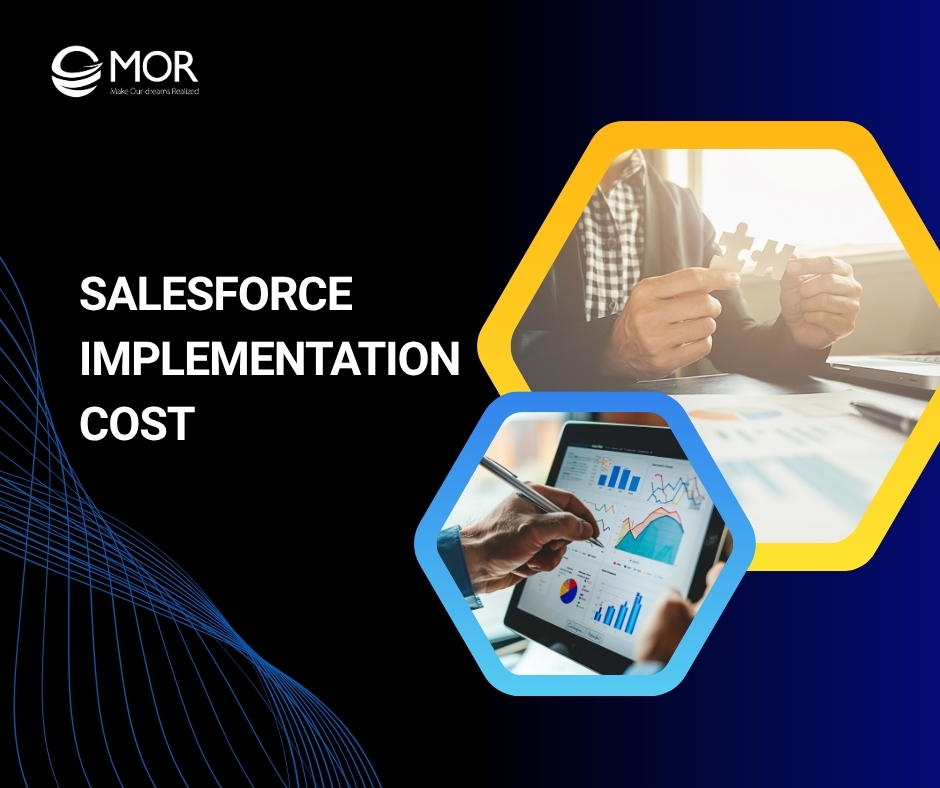
Knowing your Salesforce implementation cost upfront can save your business from budget surprises and wasted resources. Many companies underestimate expenses tied to customization or user training. This MOR Software’s guide explains the typical costs for Salesforce implementation and helps you plan smarter for 2025.
Why Understanding Salesforce Implementation Cost Is Important?
Investing in Salesforce is not just a technology upgrade, it’s a business decision that shapes long-term growth. When companies underestimate or miscalculate their Salesforce implementation cost, they risk running into budget overruns, hidden charges, or delayed project delivery. It’s a common pattern in technology programs, where large IT initiatives have historically come in about 45% over budget and 7% behind schedule on average, which is exactly why cost clarity is important upfront.
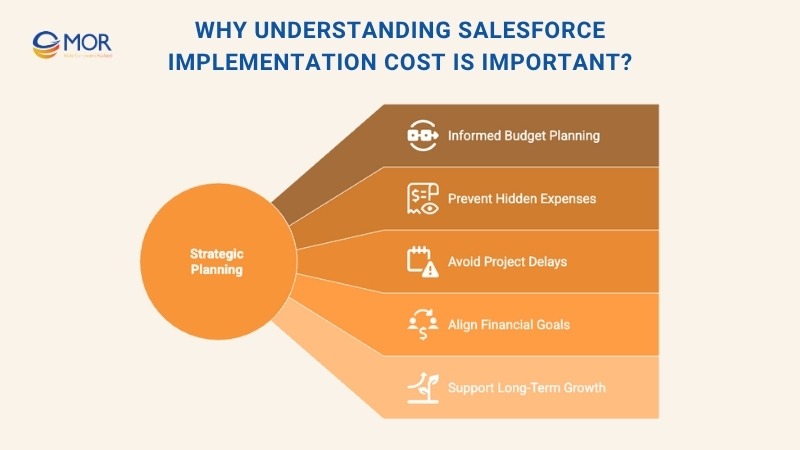
Getting a clear view of the typical costs for Salesforce implementation helps teams prepare for both upfront investments and ongoing expenses, including system customization, integrations, and maintenance.
Working with a trusted Salesforce implementation partner ensures accurate cost planning and smooth deployment. Implementation costs can vary widely, from a few thousand dollars for small setups to over a hundred thousand for complex enterprise systems. The final price depends on business size, customization level, and integration scope.
Understanding these numbers early gives decision-makers the confidence to plan realistically, align budgets, and avoid surprises later in the process. Before we examine each cost component, it’s worth considering why so many companies choose Salesforce and the long-term value it adds to business performance.
The True Value Behind Salesforce Investment
Before estimating the Salesforce implementation cost, it’s worth looking at why this CRM remains one of the most valuable investments for modern businesses. Salesforce is more than a standard customer relationship tool. It’s a unified platform that connects sales, service, and marketing, offering flexibility for startups and scalability for global enterprises. Whether a business is managing leads or automating workflows, Salesforce adapts to every stage of growth.
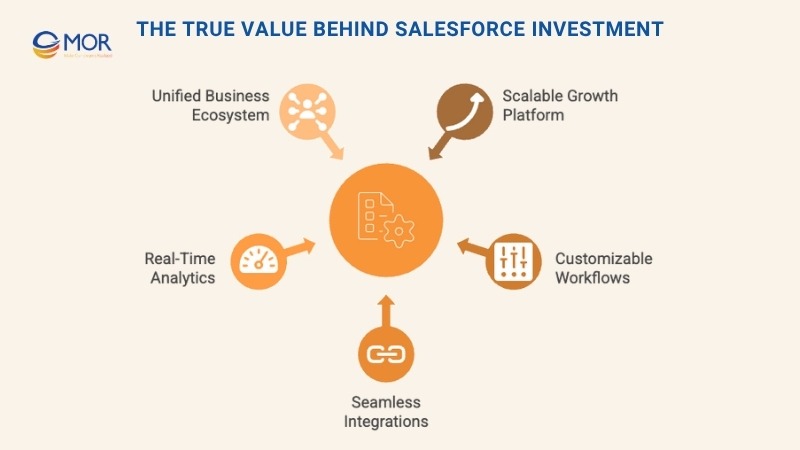
- Scalability: Salesforce grows alongside your business, allowing you to start with core features and expand as new goals arise.
- Customization: The platform’s extensive customization options let teams design workflows, dashboards, and reports that fit their exact business processes, improving productivity and customer satisfaction.
- Integration: Salesforce supports easy connection with ERP systems, payment tools, and accounting software, becoming the operational hub for many organizations. This capability also helps compute the cost in creating a Sales force more effectively by unifying all systems under one ecosystem.
- Advanced Analytics: Real-time insights and reports empower teams to make faster, data-driven decisions.
Many companies continue to rely on Salesforce because it consistently holds the largest share of the global CRM market, staying around 21.7% in 2023 and only slightly shifting to 20.7% the following year. This steady dominance reflects how deeply embedded it is in enterprise operations worldwide.
With these strengths, the average cost Salesforce implementation often pays off quickly. Even as independent analyses show CRM returns have moderated over the past decade, organizations still see about $3.10 back for every $1 invested, which is why disciplined planning around scope and partners is so important.
Average Salesforce Implementation Cost In 2025
The total Salesforce implementation cost in 2025 depends largely on your business size, goals, and project complexity. On average, companies can expect the cost of Salesforce implementation to range between $75,000 and $150,000 for a standard setup.
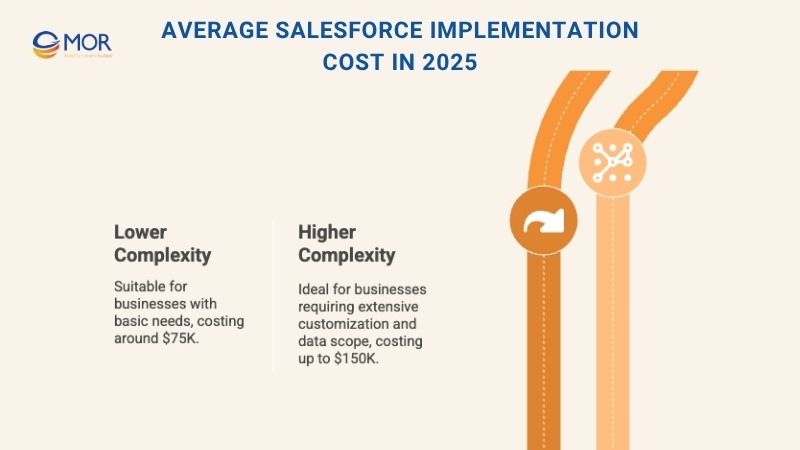
This figure represents the Salesforce implementation costs typically reported across mid-sized businesses, covering setup, customization, and integration. Smaller projects may cost less, while complex, enterprise-grade deployments can exceed this range.
Note: This is only an estimated figure. The actual pricing may vary based on scope, data migration needs, and support levels required throughout implementation.
Key Factors Influencing Salesforce Implementation Cost
Several elements directly influence your overall Salesforce implementation cost. Understanding them helps you plan better and avoid unnecessary spending.
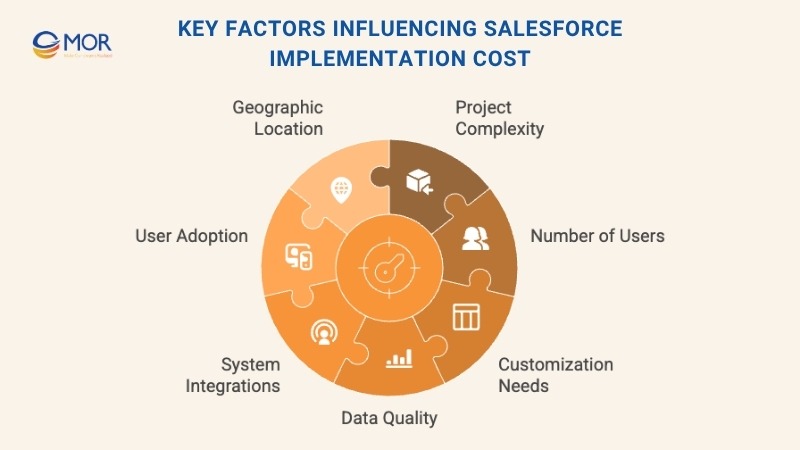
Project Complexity
Complexity is the biggest driver of cost. Projects that include deep customization, data migration, or integrations take more time and resources. The more intricate your workflows, the higher the CRM implementation cost becomes.
Number Of Users
The number of users impacts both the Salesforce license cost and training expenses. Larger companies with many users need more seats, which increases total pricing and setup time.
Customization Level
Advanced customization requires technical expertise. Creating custom modules, dashboards, or apps increases overall Salesforce implementation costs, especially when built from scratch to match unique business needs.
Data Quality
Poor data quality can quickly raise costs. Cleansing, formatting, and validating old records before migration add extra hours to the process, directly affecting Salesforce implementation cost.
System Integrations
Integrating Salesforce with ERP, accounting, or marketing tools adds development effort. The more systems you connect, the longer and costlier the process becomes for Salesforce implementation.
User Adoption
Even the best CRM setup fails without proper training. Teams that need more onboarding support or long-term guidance will see a higher Salesforce training cost overall.
Geographic Location
The cost of hiring developers or consultants varies by region. Projects managed in high-cost countries tend to have higher typical costs for Salesforce implementation than those outsourced to cost-effective destinations.
Cost Of Salesforce Implementation Services
Breaking down your Salesforce implementation cost by category gives a clearer view of where your budget will go. Each service plays a unique role in ensuring a smooth rollout and long-term success.
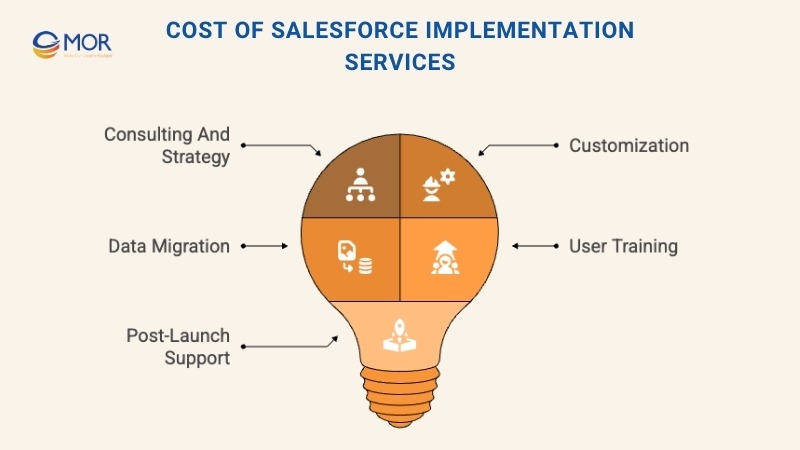
Consulting And Strategy
The first step in most projects involves consulting and strategy development. A certified consultant or Salesforce implementation partner helps you define requirements, assess current systems, and build a project roadmap. Depending on the project’s scope, this stage can last from a few weeks to several months. The average cost ranges between $5,000 and $20,000, but larger enterprises with complex operations may spend more to align CRM goals with business strategy.
Customization
Customization allows you to tailor Salesforce to your specific processes, ensuring that every feature supports daily operations. While small adjustments like custom fields, workflows, and dashboards might cost $10,000 to $20,000, deeper modifications such as third-party app integrations or custom application development can exceed $50,000. These costs often depend on the skills required and average cost Salesforce implementation for the desired level of functionality.
Data Migration
Data migration is a major contributor to the total Salesforce implementation cost. It involves transferring data from legacy systems into the new CRM, ensuring accuracy, structure, and consistency. This process can be lengthy, especially when dealing with large databases or inconsistent records. Depending on data volume, format, and quality, expenses usually range from $5,000 to $50,000. Clean data and clear mapping requirements can help lower the overall cost of Salesforce implementation.
User Training
Training determines how quickly your team adopts Salesforce and gets value from it. Without proper guidance, employees may underuse critical features. Salesforce provides flexible learning paths, from online courses to in-person workshops. The Salesforce training cost can range from $500 to $5,000 per user, depending on the program type, user roles, and certifications required. Investing in proper training ensures faster adoption and higher ROI.
Post-Launch Support And Maintenance
Once deployment is complete, continued support keeps your system optimized and secure. Regular updates, performance checks, and issue resolution help maintain productivity and user confidence. The annual cost for post-launch maintenance varies by service level, typically between $10,000 and $45,000. Businesses seeking 24/7 support or proactive monitoring may see higher Salesforce implementation costs, but these services guarantee system stability in the long run.
Salesforce CRM Pricing Of Core Products
Salesforce provides a suite of CRM products tailored for different business needs, including Sales Cloud, Service Cloud, Marketing Cloud, and Commerce Cloud. Most companies start with Sales Cloud and Service Cloud, then expand to Marketing Cloud as they grow. Each product has its own pricing structure and subscription options that affect the total Salesforce implementation cost.
When businesses combine these core solutions, they can unlock full CRM potential by adding tools like Salesforce CPQ and Billing, Pardot, or AppExchange integrations. These additions enhance performance but also raise the average cost Salesforce implementation since every extra feature increases subscription and setup expenses.
Sales Cloud Pricing
Sales Cloud operates on a subscription-based model and is offered in four main editions, each designed for different organizational needs and budgets.
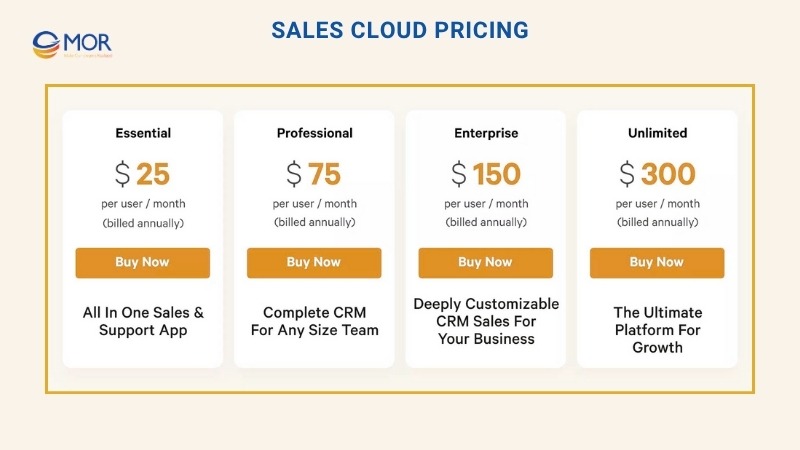
Add-on Pricing
Sales Cloud functionality can be expanded through various paid add-ons. While these improve capabilities, they also raise the Salesforce implementation costs over time. Businesses should calculate both the base license and add-on fees before deployment.
CPQ And Billing
Priced from $75 per user per month, CPQ and Billing help automate pricing, configure complex quotes, and manage billing efficiently. It’s available for Sales Cloud Professional editions and higher.
Sales Cloud Einstein
This AI-driven add-on costs $50 per user per month for Enterprise plans and above. It introduces predictive analytics and automation to improve productivity and forecast accuracy.
Pardot (Account Engagement)
For businesses with over 10,000 contacts, Pardot is a valuable upgrade that strengthens marketing automation. Priced at $1,250 per month, it significantly contributes to the overall Salesforce implementation cost, but delivers measurable marketing ROI.
Service Cloud Pricing
Similar to Sales Cloud, Service Cloud follows a subscription-based model and is offered in four editions with annual billing. The edition you choose directly influences your Salesforce implementation cost, as higher tiers come with expanded automation, reporting, and customer service tools.
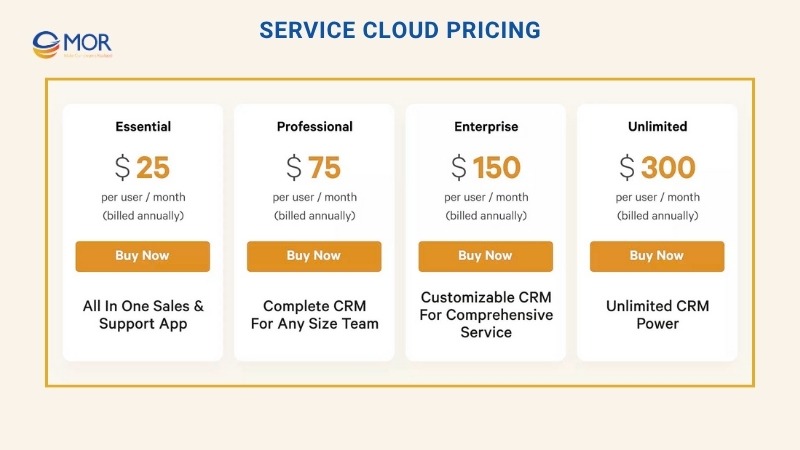
Add-on Pricing
Businesses can further improve customer experience by investing in Service Cloud add-ons that focus on efficiency and engagement. Each enhancement contributes to the overall Salesforce implementation costs, so it’s important to plan strategically.
Field Service
Starting at $50 per user per month, this add-on is available for Enterprise editions and above. It allows teams to manage mobile and remote service operations efficiently, from scheduling to on-site support.
Digital Engagement
Priced at $75 per user per month, this feature enables real-time communication with customers across multiple digital channels. It’s ideal for organizations looking to unify chat, email, and social service under one system.
Service Cloud Einstein
At $50 per user per month, this AI-powered enhancement gives businesses smart recommendations and predictive analytics. It helps compute the cost in creating a Sales force that delivers faster, more accurate, and customer-focused service outcomes.
Estimating Your Total Salesforce Implementation Cost
Once you understand how Salesforce products are priced, calculating your Salesforce implementation cost becomes much simpler. You don’t necessarily need a calculator, just a clear count of users and the editions you plan to deploy. Multiply the total number of users by the license cost of your chosen Salesforce editions, then add potential service and add-on expenses.
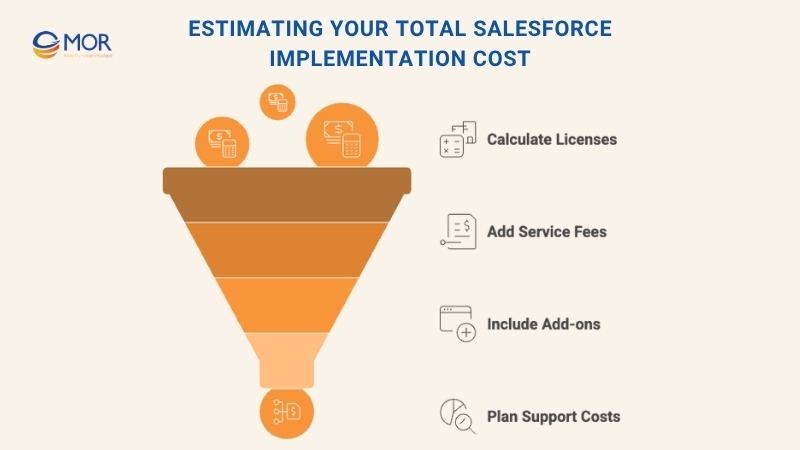
Example Scenario
Imagine a mid-sized company with active Sales, Service, and Marketing teams:
- 3 C-suite executives
- 1 sales administrator
- 5 field sales representatives
- 15 in-house sales agents
- 1 service manager
- 10 customer support agents
- 3 marketing professionals seeking shared insights
This company chooses the Enterprise edition for both Sales and Service Cloud, plus the Salesforce Field Service add-on. Their estimated annual subscription would be around $62,400 ($59,400 for Sales and Service Cloud licenses and $3,000 for Field Service).
Note: The $62,400 covers only subscription expenses. Hiring a professional Salesforce implementation partner will raise costs based on scope, timeline, and engagement model.
Factoring in implementation services:
Breakdown | Estimated Cost |
| Consulting and Strategy | $10,000 |
| Customization | $15,000 |
| Data Migration | $15,000 |
| User Training | $2,000 |
| Post-Launch Support | $25,000 |
| Salesforce Subscription | $62,400 |
| Total Implementation Services | $67,000 |
| Average Salesforce Implementation Cost | ≈ $129,400 |
This table illustrates how quickly the Salesforce implementation costs add up once services and licenses are combined. Understanding each element helps predict how much does a Salesforce implementation cost for your business with greater accuracy.
Comparing Salesforce Implementation Approaches
Businesses can choose from several methods to deploy Salesforce, each offering different levels of control, cost, and scalability. The right approach can make a major difference in total Salesforce implementation cost, project duration, and user adoption success. Below is a comparison of the most common strategies to help teams select the best fit based on their needs and available resources.
Implementation Approach | Description | Advantages |
| Full-Solution Implementation | Partnering with a certified Salesforce implementation partner to manage the entire project from planning to launch. | • Expert guidance and proven best practices • Customized setup and workflows • Reduced strain on internal teams |
| In-House Implementation | Using internal IT and admin resources to execute the deployment independently. | • Greater project control • Potential savings on consulting fees |
| Phased Implementation | Introducing Salesforce gradually, one team or department at a time. | • Smoother change management • Opportunity to refine processes before full rollout |
| Rapid Deployment | Leveraging pre-built templates for quick configuration and launch. | • Shorter timelines • Lower upfront CRM implementation cost |
| Hybrid Approach | Combining internal staff with external consultants for selected phases. | • Balanced resource use • Access to specialized expertise when needed |
Each method offers distinct benefits depending on your company’s size, structure, and technical capabilities. Carefully weighing these options helps estimate how much does it cost to implement Salesforce and ensures your investment delivers long-term efficiency and user satisfaction.
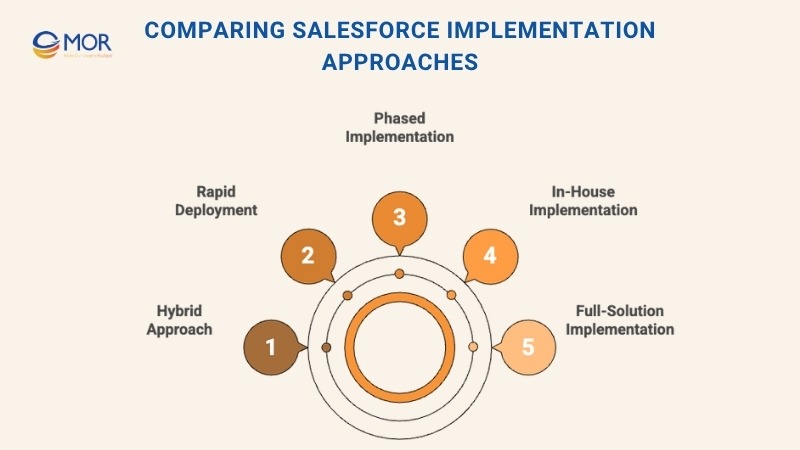
Best Practices For Planning Salesforce Implementation Cost
Smart budgeting is key to keeping your Salesforce implementation cost under control and getting full value from the investment. These practices help minimize financial risks and maintain project efficiency from start to finish.
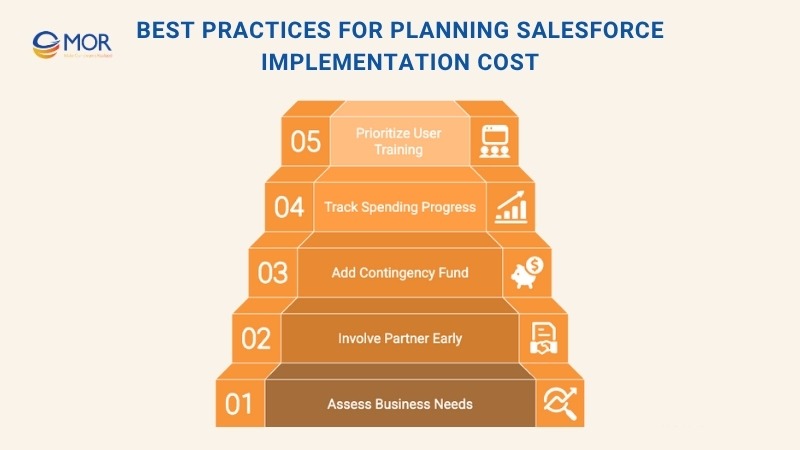
1. Assess Your Business Needs
Start by analyzing your internal processes and goals. A detailed needs assessment helps determine which Salesforce features, licenses, and customizations are necessary. This step sets a realistic foundation for estimating the total Salesforce implementation costs early on.
2. Involve A Salesforce Partner Early
Engage a certified Salesforce implementation partner during the planning stage. Their technical expertise and experience with similar projects can uncover hidden expenses and guide you toward the right solutions. Early collaboration also streamlines scheduling and improves project accuracy.
3. Add A Contingency Fund
Unexpected issues can arise in any software rollout. Allocate an extra 10–20% of your budget to handle additional configurations, licensing changes, or timeline extensions. This approach keeps your cost of Salesforce implementation stable even when surprises occur.
4. Track Spending And Progress
Regularly review expenses, milestones, and scope adjustments. Staying close to your budget helps prevent financial oversights. If costs begin to rise, coordinate with your partner to recalibrate the plan before it affects overall delivery.
5. Prioritize User Training And Change Management
No matter how well the system is built, success depends on user adoption. Set aside funds for onboarding and continuous learning. The right training reduces errors, strengthens engagement, and ultimately lowers long-term Salesforce implementation costs by improving efficiency.
MOR Software – Trusted Partner For Salesforce Implementation
At MOR Software, we go beyond estimating your salesforce implementation cost. We work side by side with your business to design, deploy, and maintain Salesforce solutions tailored to your goals and budget.
Our certified Salesforce developers bring years of experience in system integration, automation, and process optimization to help you achieve faster ROI with predictable costs.
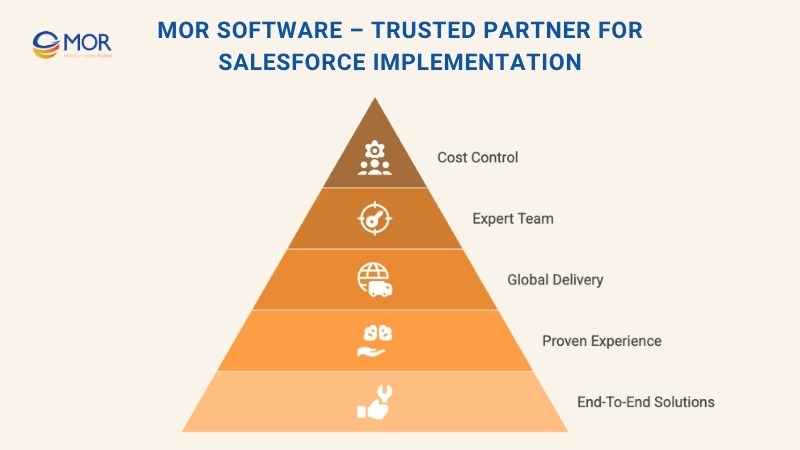
End-to-End Salesforce Solutions
Our Salesforce implementation services cover every stage of your project, from early consultation to post-launch maintenance. We help companies of all sizes plan, build, and scale their Salesforce environments to match their operations, industry, and financial goals.
- Consulting and Strategy: We assess business needs, define project scope, and build a clear roadmap that fits your financial plan.
- Development and Customization: From workflow automation to ERP and Slack integration, we develop scalable Salesforce environments that fit your operations.
- Data Migration: We transfer legacy data securely, maintaining accuracy and consistency throughout the transition.
- User Training: Our team provides online or onsite training to help your employees adopt Salesforce quickly.
- Support and Maintenance: Continuous monitoring, updates, and troubleshooting ensure long-term system stability and reduced ownership costs.
Proven Experience in Salesforce Projects
We have delivered Salesforce solutions across industries, each demonstrating our expertise in complex integration, automation, and workflow design. Below are three examples that showcase how we deliver measurable results while maintaining cost transparency in every salesforce implementation cost.
1. Workforce Management with Salesforce and Slack Integration
For a Japanese enterprise specializing in workforce management, we built a cloud-based attendance tracking system integrating Salesforce and Slack. The platform enables employees to log attendance via Slack commands, while managers monitor real-time data directly in Salesforce. Using Force.com, Apex, AWS, and Slack SDK, our 8-member team delivered the solution in five months under an Agile approach. The result: reduced administrative time, improved data accuracy, and higher workforce transparency, all within the client’s planned budget.
2. Integration Salesforce with Legacy System
We partnered with a Japanese HR company to integrate Salesforce with its legacy PitTouch time clock system. The project involved creating a full HRM platform on AppExchange with Apex, LWC, and Lambda, supported by an API Gateway and ETL data migration. The system achieved real-time, bidirectional synchronization between legacy data and Salesforce, improving operational accuracy and simplifying data management. The 15-month project, handled by 18 developers, delivered measurable ROI without exceeding the projected salesforce implementation cost.
3. Developing Salesforce Customer 360 Solution
For a global enterprise aiming to unify customer data, we customized Sales Cloud, Service Cloud, and Experience Cloud to create a centralized Customer 360 platform. Our 30-person development team automated sales workflows, optimized service operations, and enhanced marketing performance through Account Engagement tools. Built using Apex, LWC, Aura, and Visualforce, this 18-month project led to a 25% boost in lead conversion and improved cross-department collaboration, with full budget transparency from design to delivery.
Why Choose MOR Software?
Choosing MOR Software means partnering with a Salesforce expert that values quality, transparency, and measurable business outcomes. We focus on delivering reliable solutions while keeping your salesforce implementation cost within target through clear planning and communication.
- Experienced Salesforce Developers: A team that understands both technology and business operations.
- Agile Methodology: Faster delivery cycles and transparent cost control at every stage.
- Accurate Cost Estimation: Clear reporting and forecasting of salesforce implementation cost to avoid unexpected expenses.
- Global Delivery Model: Offices in Vietnam and Japan, supporting clients across time zones for flexible and responsive collaboration.
Conclusion
Understanding your Salesforce implementation cost early helps you plan better, avoid hidden fees, and achieve faster returns on your CRM investment. With the right strategy and partner, Salesforce can transform how your business sells, serves, and grows. MOR Software’s certified team ensures a smooth, transparent, and cost-effective implementation process from start to finish. Ready to start your Salesforce journey?
Contact us today to discuss your project.
MOR SOFTWARE
Frequently Asked Questions (FAQs)
How much does it cost for Salesforce?
Salesforce pricing varies depending on the edition and features you choose. The Sales Cloud plans generally start from around $25 per user per month for the basic version and can go up to over $300 per user per month for advanced tiers with full CRM capabilities. All plans are billed annually and include different levels of customization, automation, and analytics tools.
How much does it cost to build a Salesforce?
Building a Salesforce system typically ranges from $10,000 to $200,000 or more. The total depends on your company’s size, integration scope, and customization needs. Complex automation, data migration, and consultant expertise can significantly influence the final price.
How much does a CRM implementation cost?
CRM implementation costs vary widely based on company size and software choice. For enterprise-level systems like Salesforce, expenses can range from $5,000 for small-scale setups to well over $100,000 for organizations that need advanced configurations, consultant involvement, and integrations with multiple tools or platforms.
How much does it cost to implement Salesforce?
Salesforce implementation costs in 2025 depend on several factors, including customization needs, the number of users, and required integrations. Smaller implementations may begin around $10,000, while complex enterprise deployments with multiple systems and advanced automation can surpass $200,000, especially when ongoing support and maintenance are included.
How is Salesforce pricing structured?
Salesforce follows a subscription-based pricing model. Each user must have the same license type, and plans are billed annually. Common options include the Enterprise plan at $175 per user per month, the Unlimited plan at $350 per user per month, and Agentforce 1 at $550 per user per month. Each plan offers varying degrees of customization, automation, and support.
How to estimate Salesforce projects?
Estimating a Salesforce project usually involves several key steps: defining business goals, creating detailed user stories, reviewing your current Salesforce environment, outlining technical requirements, and aligning resources. After client and internal reviews, teams finalize timelines and costs to ensure a clear and accurate project roadmap.
What is Salesforce implementation?
Salesforce implementation is the process of deploying, configuring, and customizing the CRM platform to match business operations. It involves consulting, setup, development, integration, and data migration. The process typically includes several stages such as design, development, testing, deployment, and continuous support.
What are the benefits of implementing Salesforce?
Implementing Salesforce provides multiple advantages:
- Flexibility: Highly adaptable to various business models and workflows.
- Ease of Use: Designed with an intuitive interface for both admins and end-users.
- Accessibility and Security: Cloud-based with robust security protocols.
- Collaboration: Centralized platform for improved team communication.
- Extensive App Options: Thousands of available integrations and extensions.
- Seamless Integration: Works smoothly with other enterprise systems to enhance productivity.
Rate this article
0
over 5.0 based on 0 reviews
Your rating on this news:
Name
*Email
*Write your comment
*Send your comment
1